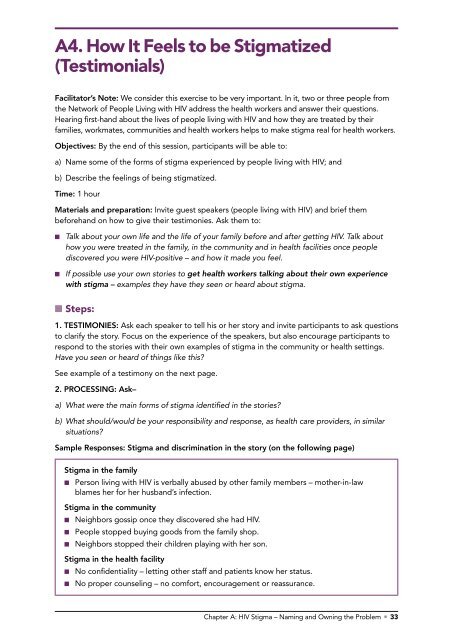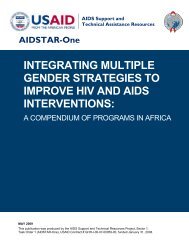HIV Stigma – Naming and Owning the Problem - ICRW
HIV Stigma – Naming and Owning the Problem - ICRW
HIV Stigma – Naming and Owning the Problem - ICRW
You also want an ePaper? Increase the reach of your titles
YUMPU automatically turns print PDFs into web optimized ePapers that Google loves.
A4. How It Feels to be <strong>Stigma</strong>tized<br />
(Testimonials)<br />
Facilitator’s Note: We consider this exercise to be very important. In it, two or three people from<br />
<strong>the</strong> Network of People Living with <strong>HIV</strong> address <strong>the</strong> health workers <strong>and</strong> answer <strong>the</strong>ir questions.<br />
Hearing first-h<strong>and</strong> about <strong>the</strong> lives of people living with <strong>HIV</strong> <strong>and</strong> how <strong>the</strong>y are treated by <strong>the</strong>ir<br />
families, workmates, communities <strong>and</strong> health workers helps to make stigma real for health workers.<br />
Objectives: By <strong>the</strong> end of this session, participants will be able to:<br />
a) Name some of <strong>the</strong> forms of stigma experienced by people living with <strong>HIV</strong>; <strong>and</strong><br />
b) Describe <strong>the</strong> feelings of being stigmatized.<br />
Time: 1 hour<br />
Materials <strong>and</strong> preparation: Invite guest speakers (people living with <strong>HIV</strong>) <strong>and</strong> brief <strong>the</strong>m<br />
beforeh<strong>and</strong> on how to give <strong>the</strong>ir testimonies. Ask <strong>the</strong>m to:<br />
■■<br />
Talk about your own life <strong>and</strong> <strong>the</strong> life of your family before <strong>and</strong> after getting <strong>HIV</strong>. Talk about<br />
how you were treated in <strong>the</strong> family, in <strong>the</strong> community <strong>and</strong> in health facilities once people<br />
discovered you were <strong>HIV</strong>-positive <strong>–</strong> <strong>and</strong> how it made you feel.<br />
■■<br />
If possible use your own stories to get health workers talking about <strong>the</strong>ir own experience<br />
with stigma <strong>–</strong> examples <strong>the</strong>y have <strong>the</strong>y seen or heard about stigma.<br />
■■Steps:<br />
1. TESTIMONIES: Ask each speaker to tell his or her story <strong>and</strong> invite participants to ask questions<br />
to clarify <strong>the</strong> story. Focus on <strong>the</strong> experience of <strong>the</strong> speakers, but also encourage participants to<br />
respond to <strong>the</strong> stories with <strong>the</strong>ir own examples of stigma in <strong>the</strong> community or health settings.<br />
Have you seen or heard of things like this?<br />
See example of a testimony on <strong>the</strong> next page.<br />
2. PROCESSING: Ask<strong>–</strong><br />
a) What were <strong>the</strong> main forms of stigma identified in <strong>the</strong> stories?<br />
b) What should/would be your responsibility <strong>and</strong> response, as health care providers, in similar<br />
situations?<br />
Sample Responses: <strong>Stigma</strong> <strong>and</strong> discrimination in <strong>the</strong> story (on <strong>the</strong> following page)<br />
<strong>Stigma</strong> in <strong>the</strong> family<br />
■■<br />
Person living with <strong>HIV</strong> is verbally abused by o<strong>the</strong>r family members <strong>–</strong> mo<strong>the</strong>r-in-law<br />
blames her for her husb<strong>and</strong>’s infection.<br />
<strong>Stigma</strong> in <strong>the</strong> community<br />
■■<br />
■■<br />
■■<br />
Neighbors gossip once <strong>the</strong>y discovered she had <strong>HIV</strong>.<br />
People stopped buying goods from <strong>the</strong> family shop.<br />
Neighbors stopped <strong>the</strong>ir children playing with her son.<br />
<strong>Stigma</strong> in <strong>the</strong> health facility<br />
■■<br />
■■<br />
No confidentiality <strong>–</strong> letting o<strong>the</strong>r staff <strong>and</strong> patients know her status.<br />
No proper counseling <strong>–</strong> no comfort, encouragement or reassurance.<br />
Chapter A: <strong>HIV</strong> <strong>Stigma</strong> <strong>–</strong> <strong>Naming</strong> <strong>and</strong> <strong>Owning</strong> <strong>the</strong> <strong>Problem</strong> n 33
















